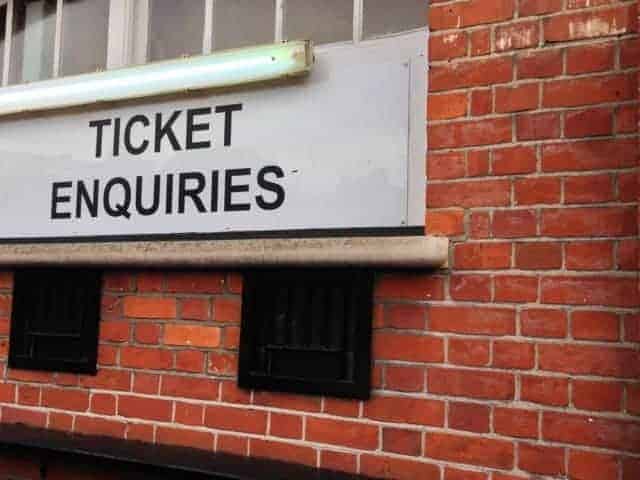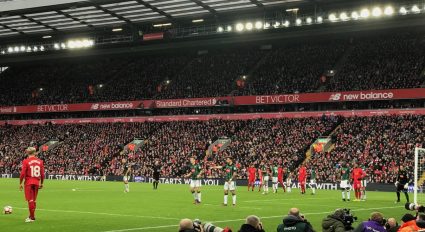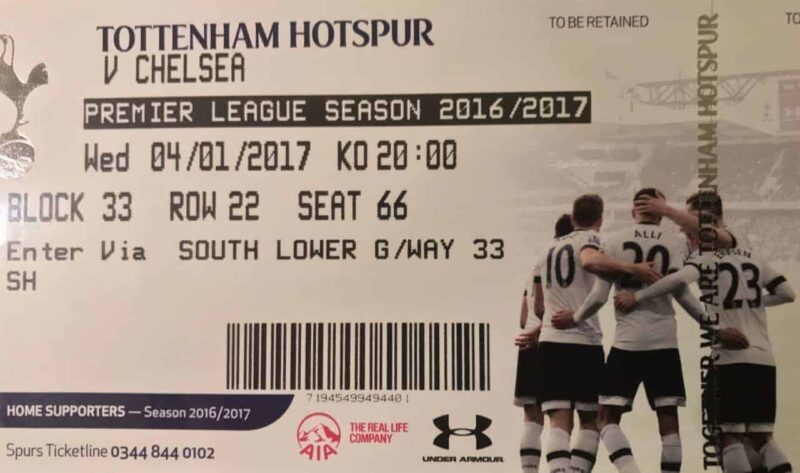Occasionally, when Groundhopper Guides is helping an English soccer fan who wants to see one…
Updated for the 2023-24 Season: How to Buy Tickets for English Soccer Games

Having attended more than 200 games, Groundhopper Paul has a lot of experience buying tickets for English soccer. Here are his tips for getting Premier League tickets and more.
This post was updated July 2023.
What Do English Soccer Tickets Cost?
To get into a Premier League match, expect to pay something along the lines of £40 to £60 — if you manage to get them from the club, which is tough. More on that in a bit.
Over the last year, the Pound has averaged around $1.30, so we’re talking $50 to $80.
In the Championship (second tier of leagues), I typically pay about 40 quid (50 bucks), and it’s lower than that in lower leagues.
For Cup games (see below), I have seen them as low as 10 pounds ($12), and sometimes for Cups they run a “kids for a quid” thing that makes for a real family atmosphere.
We Sell Premier League Tickets!
Buying English Soccer Tickets From the Club
This is the simplest and most obvious route for tickets, but there are still some things to know, like how clubs allocate tickets. Basically, they start with season ticket holders, then members (more on that in a moment), then the general public gets a shot. But many games never even make it to the “general sale” stage — especially at the big Premier League clubs.
It basically depends on which club you’re dealing with, and whom they’re playing. Teams have tiers of games with different pricing and requirements for each. For example, if Manchester City are playing Manchester United, there’s no way that game goes on sale to the general public; there just won’t be any tickets left after season ticket holders and members get their shot. And even for those folks, the price will be higher, and there will be a lower ticket-per-person limit, than if City were playing someone like Burnley. If you’re determined to see one of these higher-level games involving top clubs, even a membership probably won’t get you in, so you’ll be dealing with an authorized reseller or hospitality package (see below).
Many clubs also have a ticket exchange on their website, allowing season ticket holders who can’t make a game resell their tickets to paid club members.
Very few games outside the Premier League sell out, so buying straight from the club is the way to go.
Ticket tip: If you’re buying from a club, it’s critical to pay attention to on-sale dates. Premierleague.com has a ticket-status page for each game, but all they do is direct you to the club sites. Once at the club site, you’ll need to look for the “general sale” date for your match and jump on it that day, keeping in mind the different time zones.
English Soccer Memberships: Paying for Ticket Access
One of the many things England has that the U.S. doesn’t is paid club memberships. This is where you pay an annual fee for various perks like the club newsletter, a trinket of some sort, a loyalty-points account … and access to buy tickets before the “general sale” date. There are different levels at each club, and from what I’ve seen you can expect to pay around $50 per season for this. Some of them have a cheaper international or “lite” membership that gets you a chance to buy tickets for one or two games.
Paying $50 just for the chance to maybe buy a ticket may seem silly, but I worked for two years to get any ticket to Liverpool, and I finally (barely) got one ticket to a midweek League Cup game.
Ticket tip: Check on international memberships if you’re only trying to get into one game, or “lite” memberships if you don’t care about stuff like their annual gift.
Find out more about memberships and when you may need them.
Serious Access: Hospitality Packages in English Soccer
All clubs have various levels of suite/box experience available — at a cost, of course. These generally include some combination of food, beverages, hotel and stadium tour. They range from maybe $100 or less at a small club to $400-500 (and up) at bigger clubs and at fixtures like the FA Cup Final or Champions League games.
Find out more about hospitality packages.
Ticket tip: Groundhopper Guides is an official reseller of hospitality packages for many clubs in England and Europe. Get in touch for a quote!
Cups: Easier to Get Into
If you’re determined, say, to get into Old Trafford to see Manchester United, you probably won’t care who they’re playing. Unless you’re loaded with cash you won’t see them play Liverpool or Chelsea, but you have a decent chance at some of the lower-level games.
One thing to watch for here is Cup games. (Here’s a quick introduction to the leagues and cups of English soccer). They tend to be a bit cheaper and easier to get, at least in earlier rounds, against smaller opponents. I got killer seats at Old Trafford (for about $50) for a League Cup game on a Tuesday night in January. It was a semifinal leg, but it was the David Moyes season, and the fans were losing faith. Also, the opponents were Sunderland, not one of the heavyweights of the sport.
Another fun thing about Cup games is that there will be more away fans, due to Cup rules. So when I saw Sunderland win that game at Man United, instead of the usual 3,000 away fans at a League game, there were 9,000 delirious Sunderland fans in the end having the time of their lives.
There are also European competitions, but those are tough tickets indeed. For a whole discussion of the leagues and cups of English football, see the link above.
Ticket tip: Pay attention to when the draws for each round are announced, usually right after the previous round is finished. Set up Google News Alerts for “fa cup draw” and “efl cup draw” to make sure you know about them. Or just check in regularly at thefa.com for the FA Cup and efl.com for what everybody calls the League Cup.
Lower Leagues: “I Just Want to See a Game!”
If you’re like me and don’t care about seeing only the top teams, you should definitely consider going to a Football League game instead of a Premier League game. English football is arranged in a pyramid, with the Premier League at the top with 20 teams; under that, in three leagues of 24 each, are the Championship, League One, and League Two – collectively called the Football League.
Learn more about all the lower-league clubs in and around London.
All of these are much easier, and cheaper, tickets to get – unless you’re talking about a rivalry game (aka a “derby”), a big Cup game, or a late-season game with major consequences in the table (standings).
For example, if you’re going to London and want to catch a game, any game, there are, in (or within an hour of) Greater London:
- 8 Premier League teams: Arsenal, Brentford, Chelsea, Crystal Palace, Fulham, Luton Town, Tottenham Hotspur, and West Ham
- 3 Championship teams: Queens Park Rangers, Millwall, and Watford
- 6 League One teams: Cambridge United, Charlton Athletic, Leyton Orient, Reading, Stevenage, Wycombe Wanderers and Oxford United
- 3 League Two teams: Crawley Town, Sutton United and Wimbledon.
And that’s just in the Premier League and Football League!
I created this Google Map of the top six tiers of leagues around the UK; zoom in on London and select the different leagues to see what I’m talking about.
The same situation is true of other big cities like Manchester and Birmingham, so don’t limit yourself to just the Premier League. In many ways, I find the Football League to be a more enjoyable experience, with smaller stadiums and longtime dedicated fans.
Buying Away Team Tickets
Sometimes the best way to get in is with the visiting team. For example, in my quest to see a game at Liverpool, I might decide to buy tickets from West Bromwich Albion when they are playing there. And this might work. But one of my rules for attending English soccer games is “Don’t sit with the away fans unless you’re one of them.” I’m not quite that strict about it, but in my experience, the away fans tend to be the hard-core ones, and life in the away end can get quite rowdy. But getting away tickets can be hard, so don’t get your hopes up.
I had a great time with the Sunderland people at Chelsea, but I had friends in there, and Sunderland won – which brings me to another rule, “Don’t show your away colors outside the stadium.”
Related: Is it Safe to go to English Soccer Games?
Third Parties: Websites and Touts
Let’s get this term out of the way first: a tout in England is a scalper in the States. I have no experience with them in person, and I really don’t intend to. Still, I have researched third-party websites just a little.
I would start with the standard “safe ticket buying” link on the Premier League website, where you can also see the latest on tickets for each fixture. They also have a list there of unauthorized reselling websites.
The main thing to remember is, although you’re buying a ticket for a game in the UK, the transaction isn’t taking place there, because it’s illegal. So you’re kind of in the Wild West, and we’ve heard a variety of difficult stories: people being ripped off, people having to meet somebody before and after the game to get a card instead of regular tickets, and orders being canceled because prices went up and the seller got a better deal.
As for “legit” websites, near as I can tell, that list occasionally includes Viagogo and Stubhub — because in some cases they have official relationships with some of the clubs. However, these sites are also well-known for being used by touts, so buyer beware.
Looking to see a football game in England? Fill out this form and let us know which fixtures you’re interested in, and we’ll send you a quote.









Post Comments